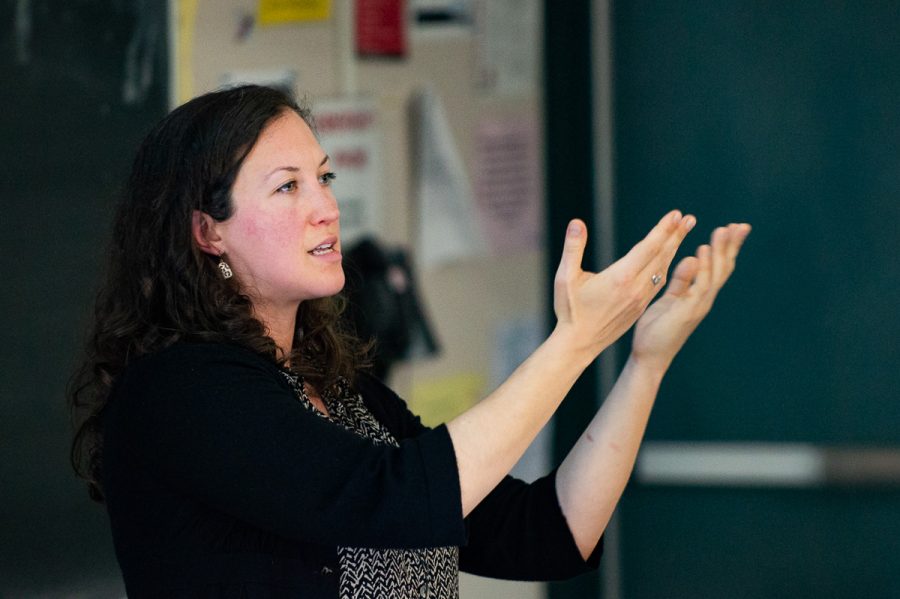Caitlin Taylor, postdoctoral fellow at the department of UCSB’s department of Psychological and Brain Sciences, shared her discoveries on the birth control pill and its effects on the human brain last Friday, April 20.
Taylor’s speech took place at the SBCC Earth and Biological Science Building, and was hosted by the SBCC Neuro Club.
Taylor studied in Georgetown for her undergraduate degree. Taylor said that while in graduate school, she attended a talk by Margaret McCarthy about her work on gender differences that inspired her to want to study hormones and the influence they have on the brain.
A year after graduating from Georgetown University, Taylor came to UCSB, where she learned about the historical and political context of the birth control pill in the last sixty years.
Clinical trials on the pill were only conducted on male animals before it was put on the market. As a result, for the past 10 to 20 years, new drugs have been recalled because of the side effects they had on females.
In 1962, Thalidomide, a form of anti-nausea and morning-sickness drug was released in Europe, which caused pregnant women taking the drug to have babies with severe birth defects, and as a result, the FDA had to take control on how research was being done.
Taylor talked about Margaret Sanger, who was an advocate for women’s reproductive rights. Sanger had a dream to come up with a “magic pill” to prevent pregnancy, in a time when it was more common for women to die when giving birth. One of those women were Sanger’s mother.
Sanger decided to open a clinic, but was shut down by the FDA. Still. Sanger continued to her research on her magic pill.
Sanger achieved her dream at 70 years old, when the FDA finally approved the pill. This led to the opening of the first birth control clinic in the U.S., known today as Planned Parenthood.
In 1966 only married couples had the right to use birth control, and it wasn’t until 1972 that all women were able to use birth control, based on the laws in their state. This led to social changes, with more women getting educated and contributing more to the U.S. labor force.
Taylor commended these advances.
“Women were able to control their futures and decide if they wanted to have children,” Taylor said.
Today hormonal contraceptives can be used in the form of an implant, shot, patch, and intrauterine device. The most commonly used form, however, is the birth control pill, which is one of many that contains estrogen and progestin. It disrupts the menstrual cycle and stops females from ovulating which results in no pregnancy.
According to a study Taylor cited, women who have been using the pill for more than 10 years have an easier time coping with menopause. Some factors affecting menopause are when a woman began taking the pill, the dosage, and how long they’ve been on it.
“I’m not pro, I’m not anti pill, I’m just pro information,” Taylor said.
This past year Taylor has gathered data by asking UCSB female students to participate in online surveys asking about family health and the history of hormonal use. Although we still don’t know what the exact effects of the birth control pill are on the human brain, it’s something researchers still continue to study.
After Taylor’s speech, City College psychology professor Leida Tolentino expressed her feelings about the speech.
“I think it’s important to begin opening our eyes to what we yet have to learn,” Tolentino said.




![Milton Alejandro Lopez Plascencia holds a flag showcasing the United States and Mexico on Feb. 7 in Santa Barbara, Calif. “It’s heartbreaking to see what is happening all across the country,” Lopez Plascencia said. “I [want] my voice to be heard by the community.”](https://www.thechannels.org/wp-content/uploads/2025/05/MGSImmigration-1-1200x800.jpg)


![The new Dean of Social Science, Fine Arts, Humanities and English, Eric Hoffman beams on May 2 in Santa Barbara, Calif. "My major professor in college [inspired] me," Hoffman said. "You can really have a positive impact on people's lives in education."](https://www.thechannels.org/wp-content/uploads/2025/05/MGSHoffman-2-1200x800.jpg)







